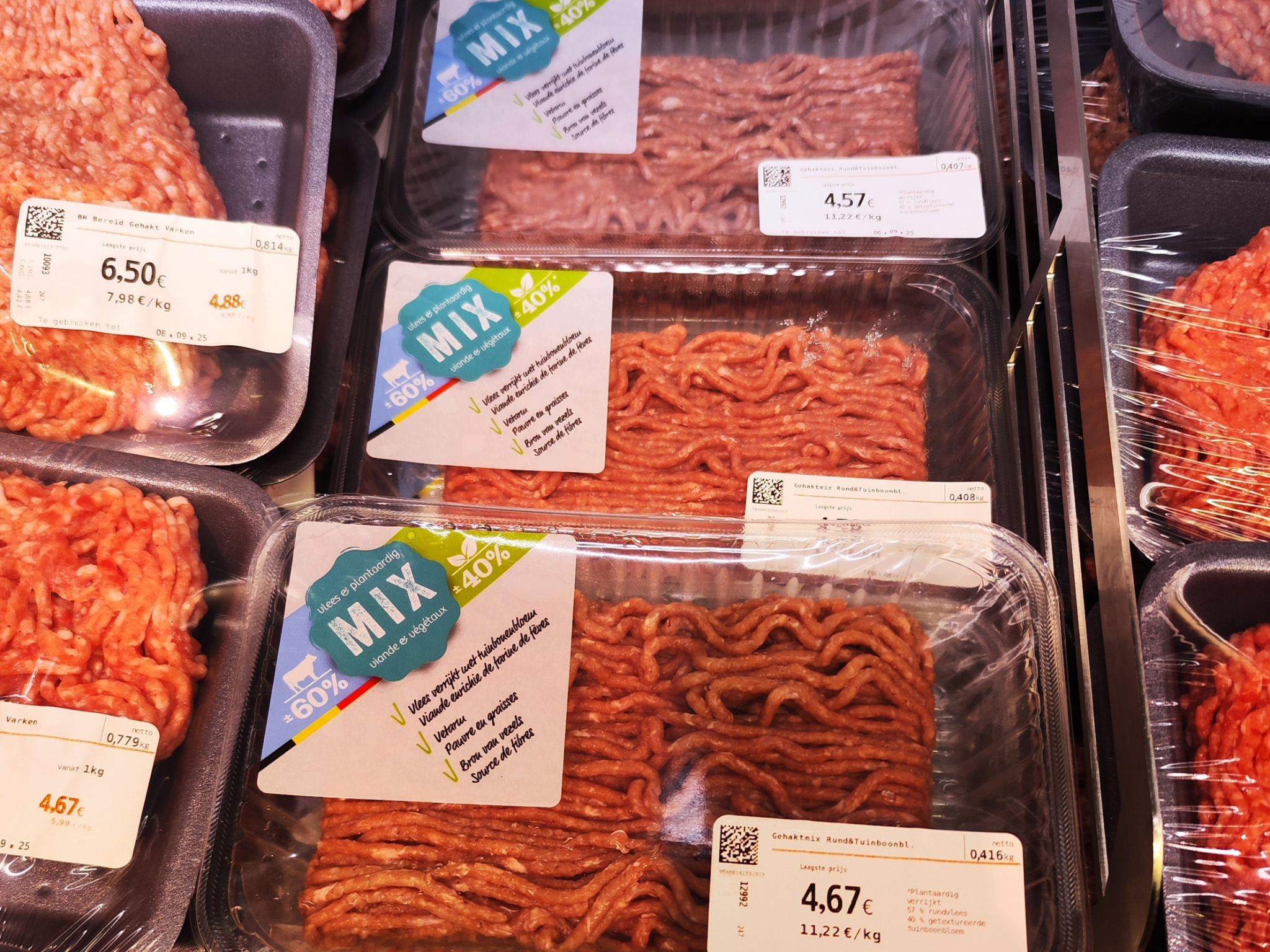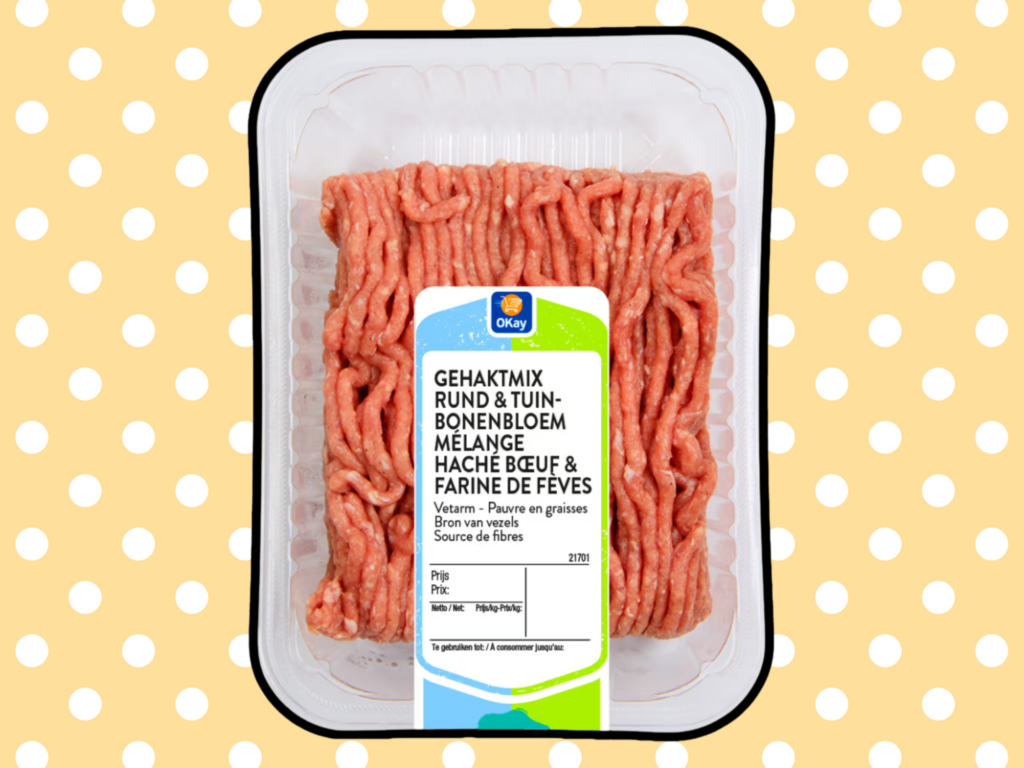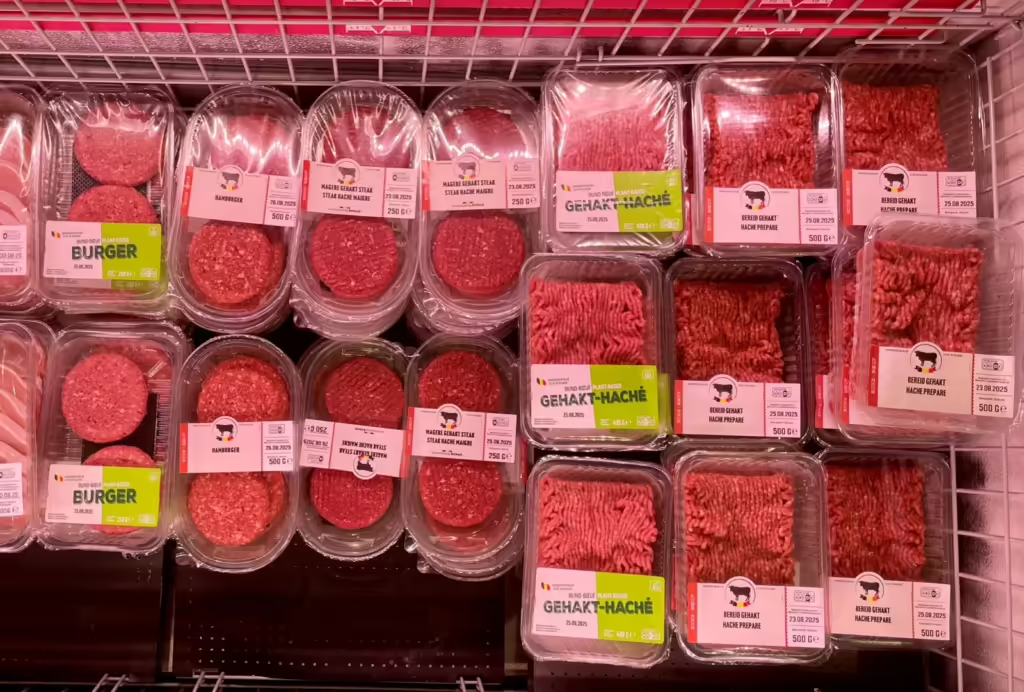
Belgium’s largest supermarket chain, Colruyt Group, has introduced a new blended beef mince product, following similar launches from Lidl, Albert Heijn and Aldi this year.
Europe’s retailers are betting the farm on blended meat.
The Netherlands has led the way, with three major supermarket chains rolling out blended meat and milk products over the last year. Now, its neighbour is joining the race.
Since May, three retailers have unveiled blended meat products, and to great success. Colruyt Group, the country’s largest, trialled three sausages with 38% plants for the BBQ season, Lidl brought out blended burgers and beef, Albert Heijn debuted the Swapburger with 27% tomato and sugar beet fibre, and Aldi introduced a mince product with 40% plant protein.
Now, Colruyt and Lidl are both doubling down on the concept, adding more products to their lineups to meet Belgians’ appetite for blended proteins.
Colruyt’s blended meat push part of ‘protein split’ goal

Last week, Colruyt announced that it had begun offering blended beef mince at the butcher’s counter of its Colruyt Lowest Prices and Okay stores in Belgium, combining 60% beef with 40% fava bean flour.
The move helps reduce the reliance on animal protein without compromising on taste or texture, and boosts fibre while lowering saturated fat and dietary cholesterol.
“We are starting with a new range of plant-enriched meat for customers who consciously want to reduce their meat consumption. The range was developed and produced internally thanks to collaboration between our different departments,” said Pascal Dekelver, meat division manager at Colruyt Lowest Prices.
“Our goal is to offer 60% proteins from plant sources and 40% from animal sources by 2028. With this, we want to contribute to the protein shift and to Colruyt Group’s Green Deal commitment,” he added.
This is why Colruyt described its decision to place the blended meat in the butcher’s section, calling it a “good intermediate step for consumers who want to eat more plant-based food or simply want to try something new, while also being mindful of health and the environment”.
The supermarket group, which introduced own-label vegan brand Boni Plan’t this year, added that some consumers still view plant-based meat as being “too far removed” from the experience conventional meat provides.
“We want to reduce the ecological footprint of food by encouraging our customers to gradually consume fewer animal proteins and more often opt for plant-based alternatives, the production of which has a lower environmental impact,” said Dekelver.
Colruyt isn’t just stopping here. Next month, it will launch sausages where 25% of the beef and pork will be replaced by mushrooms and seaweed, and hamburgers with 25% pumpkin.
Blended beef makes up a third of Lidl’s mince sales

Lidl, already a retail leader in the protein transition, trialled a new hybrid cheeseburger in Belgium last month, on the back of a successful launch of its blended meat category in the summer.
The discounter said one in four burgers sold since June has been a blended patty made from 60% beef and 40% plant protein. The figures are even more encouraging for beef mince, with the blended version making up a third of all sales.
According to Lidl, these sales represent savings of nearly 190kg of carbon emissions per store per week, with a large factor behind the products’ success being their prominent in-store placement.
“When it comes to eating less meat, many people still think in terms of all or nothing. That’s precisely why we’re so proud of this new and growing range. We want to inspire people in an accessible way to choose a more sustainable alternative,” said Lidl spokesperson Isabelle Colbrandt.
Ines Verschaeve, head of sustainable purchasing policy at Lidl Belgium and Luxembourg, added: “Consumers are still free to choose, but thanks to an ever-increasing range of plant-based proteins, whole-grain products, and fruits and vegetables, they can more easily make more sustainable choices. This hybrid meat range is a concrete and excellent example of this.”
Lidl has pledged to replace 20% of its current meat and dairy sales with plant-based proteins by 2030, and has been joined by several other supermarkets in this ‘protein split’ pledge. Albert Heijn’s parent company, Ahold Delhaize, is aiming to raise the share of plant proteins sold to 47% in 2024, 50% in 2025, and 60% by the end of the decade, matching Colruyt’s goal in Belgium.
Albert Heijn sells 15 blended protein products in the Netherlands now, including two hybrid milks, and Lidl and Aldi have introduced beef mince and burgers with 40% plants.
And this week, German canteen Speisemanufaktur Adlershof is offering a range of blended meat dishes combining beef with koji protein from Nosh.bio, whose ultimate focus is on B2B partnerships with manufacturers and retailers.
The post Belgium’s Supermarkets Are the Latest to Champion Blended Meat appeared first on Green Queen.
This post was originally published on Green Queen.